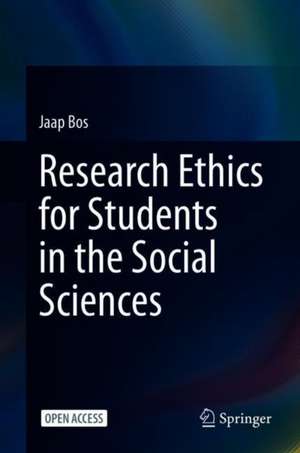Research Ethics for Students in the Social Sciences
Autor Jaap Bos Contribuţii de Friso Hoeneveld, Naomi van Steenbergen, Ruud Abma, Toon van Meijl, Dorota Lepiankaen Limba Engleză Hardback – 15 sep 2020
This book addresses problems and questions that any bachelor student in the social sciences should be aware of, including plagiarism, data fabrication and other types of fraud, data augmentation, various forms of research bias, but also peer pressure, issues with confidentiality and questions regarding conflicts of interest. Cheating, ‘free riding’, and broader issues that relate to the place of the social sciences in society are also included. The book concludes with a step-by-step approach designed to coach a student through a research application process.
| Toate formatele și edițiile | Preț | Express |
|---|---|---|
| Paperback (1) | 296.45 lei 38-44 zile | |
| Springer International Publishing – 16 sep 2021 | 296.45 lei 38-44 zile | |
| Hardback (1) | 377.39 lei 38-44 zile | |
| Springer International Publishing – 15 sep 2020 | 377.39 lei 38-44 zile |
Preț: 377.39 lei
Nou
Puncte Express: 566
Preț estimativ în valută:
72.22€ • 74.94$ • 60.36£
72.22€ • 74.94$ • 60.36£
Carte tipărită la comandă
Livrare economică 11-17 martie
Preluare comenzi: 021 569.72.76
Specificații
ISBN-13: 9783030484149
ISBN-10: 3030484149
Pagini: 233
Ilustrații: XVI, 287 p. 52 illus., 29 illus. in color.
Dimensiuni: 155 x 235 x 17 mm
Greutate: 0.64 kg
Ediția:1st ed. 2020
Editura: Springer International Publishing
Colecția Springer
Locul publicării:Cham, Switzerland
ISBN-10: 3030484149
Pagini: 233
Ilustrații: XVI, 287 p. 52 illus., 29 illus. in color.
Dimensiuni: 155 x 235 x 17 mm
Greutate: 0.64 kg
Ediția:1st ed. 2020
Editura: Springer International Publishing
Colecția Springer
Locul publicării:Cham, Switzerland
Cuprins
Introduction.- Part I: Perspectives.- Chapter 1. Science.- Chapter 2. Ethics.- Part II: Ethics and Misconduct.- Chapter 3. Plagiarism.- Chapter 4. Fabrication.- Chapter 5. Falsifying.- Part III: Ethics and Trust.- Chapter 6. Confidentiality.- Chapter 7. Science and Society.- Chapter 8. Science and Politics.- Part IV: Forms, Codes and of types Regulations.- Chapter 9. Research Ethics Step by Step.- Appendix.- Indexes.
Notă biografică
Jaap Bos is tenured Senior Researcher (Associate Professor) at the Department of Interdisciplinary Social Science, Utrecht University, the Netherlands.
Bos has a long standing career in the field of academic education. He has been teaching both in English as well as in Dutch. Furthermore, he has developed numerous courses over the past 10 years and contributed to many more.
The emphasis in his teachings is on qualitative analysis of communication (conversation and discourse analysis, content analysis), philosophy of the social sciences. He was nominated ‘best teacher of the year’ in 2009-10
Bos has written extensively on the history and philosophy of the social sciences, including several studies on psychoanalysis, a biography of the influential Dutch educationalist Martinus Langeveld, a Chronic of Dutch post-war educationalists (with Willem Koops), a study on psychoanalyst Wilhelm Stekel (with Leendert Groenendijk), and a textbook on Discourseanalysis. He was chief editor of the Dutch Journal of Biography (2012-2017). Bos is member of the departmental IRB of Utrecht University.
Textul de pe ultima copertă
This open access textbook offers a practical guide into research ethics for undergraduate students in the social sciences. A step-by-step approach of the most viable issues, in-depth discussions of case histories and a variety of didactical tools will aid the student to grasp the issues at hand and help him or her develop strategies to deal with them.
This book addresses problems and questions that any bachelor student in the social sciences should be aware of, including plagiarism, data fabrication and other types of fraud, data augmentation, various forms of research bias, but also peer pressure, issues with confidentiality and questions regarding conflicts of interest. Cheating, ‘free riding’, and broader issues that relate to the place of the social sciences in society are also included. The book concludes with a step-by-step approach designed to coach a student through a research application process.
This book addresses problems and questions that any bachelor student in the social sciences should be aware of, including plagiarism, data fabrication and other types of fraud, data augmentation, various forms of research bias, but also peer pressure, issues with confidentiality and questions regarding conflicts of interest. Cheating, ‘free riding’, and broader issues that relate to the place of the social sciences in society are also included. The book concludes with a step-by-step approach designed to coach a student through a research application process.
Caracteristici
Offers a non-technical introduction into research ethics Contains an express student-oriented perspective Has a robust didactic design (including case studies, assignments and various boxes)
